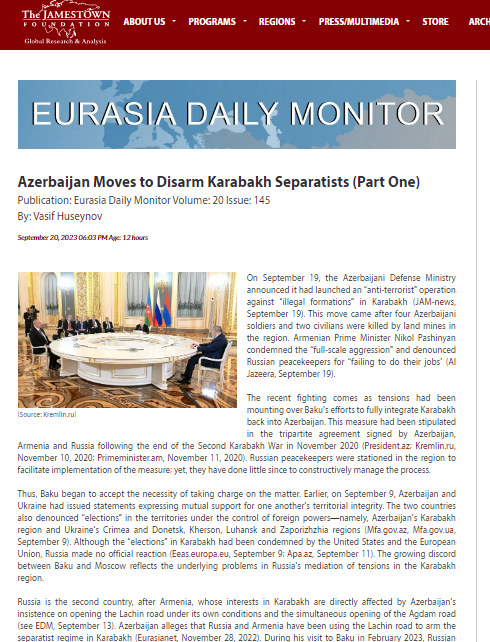On September 19, the Azerbaijani Defense Ministry announced it had launched an “anti-terrorist” operation against “illegal formations” in Karabakh (JAM-news, September 19). This move came after four Azerbaijani soldiers and two civilians were killed by land mines in the region. Armenian Prime Minister Nikol Pashinyan condemned the “full-scale aggression” and denounced Russian peacekeepers for “failing to do their jobs’ (Al Jazeera, September 19).
The recent fighting comes as tensions had been mounting over Baku’s efforts to fully integrate Karabakh back into Azerbaijan. This measure had been stipulated in the tripartite agreement signed by Azerbaijan, Armenia and Russia following the end of the Second Karabakh War in November 2020 (President.az; Kremlin.ru, November 10, 2020; Primeminister.am, November 11, 2020). Russian peacekeepers were stationed in the region to facilitate implementation of the measure; yet, they have done little since to constructively manage the process.
Thus, Baku began to accept the necessity of taking charge on the matter. Earlier, on September 9, Azerbaijan and Ukraine had issued statements expressing mutual support for one another’s territorial integrity. The two countries also denounced “elections” in the territories under the control of foreign powers—namely, Azerbaijan’s Karabakh region and Ukraine’s Crimea and Donetsk, Kherson, Luhansk and Zaporizhzhia regions (Mfa.gov.az, Mfa.gov.ua, September 9). Although the “elections” in Karabakh had been condemned by the United States and the European Union, Russia made no official reaction (Eeas.europa.eu, September 9; Apa.az, September 11). The growing discord between Baku and Moscow reflects the underlying problems in Russia’s mediation of tensions in the Karabakh region.
Russia is the second country, after Armenia, whose interests in Karabakh are directly affected by Azerbaijan’s insistence on opening the Lachin road under its own conditions and the simultaneous opening of the Agdam road (see EDM, September 13). Azerbaijan alleges that Russia and Armenia have been using the Lachin road to arm the separatist regime in Karabakh (Eurasianet, November 28, 2022). During his visit to Baku in February 2023, Russian Foreign Minister Sergei Lavrov had strongly objected to Azerbaijani plans to set up a checkpoint along the Lachin road (see EDM, March 7). Nevertheless, Azerbaijan eventually set up the checkpoint in April 2023 due to security concerns (see EDM, May 15).
Recent developments bear critical implications for both Armenia and Russia. They seriously complicate Yerevan’s stubborn endeavors to attain de-facto independence for the separatist regime (see EDM, September 13). For Russia, its glaring lack of legitimacy in mediating this situation signifies a significant step toward the restoration of Azerbaijan’s complete control over Karabakh. The resurgence of the conflict also likely signals an end to the Russian peacekeeping mission in the region. Pashinyan’s earlier recognition of Karabakh as part of Azerbaijan was at odds with Russia’s regional interests (see EDM, October 17, 2022; May 23). The lack of clarity over the status of Karabakh and Yerevan’s efforts to unify it with Armenia had served as a useful pretext for Moscow to justify the continued presence of its forces on the ground. Given events of late, this pretext no longer holds water.
A breakdown in Russian-Armenian relations in recent weeks has added more fuel to regional tensions. On September 12, Russian President Vladimir Putin blamed the Armenian government for the present political crisis in Karabakh (see EDM, September 13). Putin underscored that Yerevan has itself to blame for the lack of clarity over recognizing Karabakh as part of Azerbaijan (News.am, September 12). He emphasized that “the mandate [of the peacekeeping contingent] is still in force, and the issues of humanitarian nature, prevention of ethnic cleansing, of course, have not disappeared.” In response, on September 13, Pashinyan declared that Armenia can “no longer rely” on Russia as guarantor of its security (Caliber.az, September 13).
Some of the West’s policies have also not been entirely helpful in Azerbaijani efforts to restore its sovereignty over the whole Karabakh region. Baku treats the presence of “illegal armed detachments” of the separatist regime alongside units of the Armenian Armed Forces in Karabakh as a critical security threat (Trend.az, September 20). Hence, Azerbaijan had expected Western support in restoring its territorial integrity and preserving national security. On the contrary, some Western governments and political groups have sought to further complicate these efforts, ironically aiding Russian interests in the region.
On September 14, Acting Assistant Secretary for European and Eurasian Affairs Yuri Kim at the US Senate Foreign Relations Committee’s hearing on Karabakh put the blame for the deadlock on Azerbaijan (Armenpress.com, September 14). Kim and others demanded Azerbaijan open the Lachin road, seemingly ignoring a previous agreement reached by US Secretary of State Antony Blinken and Azerbaijani President Ilham Aliyev. On September 1, Blinken had agreed to push for the opening of the Agdam road simultaneously with the Lachin road. Thus, the tone of the Senate hearing indirectly supported Russian objectives (Turan, September 13).
It remains to be seen if Russia can maintain any semblance of its former mediating position between Armenia and Azerbaijan. Nonetheless, the recent developments in Karabakh are sure to wholly disrupt regional geopolitics, and it is doubtful that Moscow retains much trust with Yerevan and Baku. As such, the West may soon have a chance to capitalize on emerging opportunities to constructively facilitate lasting peace in the South Caucasus.
https://jamestown.org/program/azerbaijan-moves-to-disarm-karabakh-separatists-part-one/








